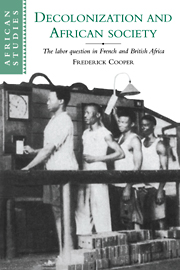Book contents
- Frontmatter
- Contents
- List of tables and figure
- Preface
- List of abbreviations
- Map of French and British colonial Africa
- 1 Introduction
- Part I The dangers of expansion and the dilemmas of reform
- Part II Imperial fantasies and colonial crises
- Part III The imagining of a working class
- Introduction
- 7 The systematic approach: the French Code du Travail
- 8 Family wages and industrial relations in British Africa
- 9 Internationalists, intellectuals, and the labor question
- Conclusion: labor and the modernizing state
- Part IV Devolving power and abdicating responsibility
- Conclusion
- Notes
- Bibliography
- Index
- OTHER BOOKS IN THE SERIES
7 - The systematic approach: the French Code du Travail
Published online by Cambridge University Press: 22 February 2010
- Frontmatter
- Contents
- List of tables and figure
- Preface
- List of abbreviations
- Map of French and British colonial Africa
- 1 Introduction
- Part I The dangers of expansion and the dilemmas of reform
- Part II Imperial fantasies and colonial crises
- Part III The imagining of a working class
- Introduction
- 7 The systematic approach: the French Code du Travail
- 8 Family wages and industrial relations in British Africa
- 9 Internationalists, intellectuals, and the labor question
- Conclusion: labor and the modernizing state
- Part IV Devolving power and abdicating responsibility
- Conclusion
- Notes
- Bibliography
- Index
- OTHER BOOKS IN THE SERIES
Summary
French and British administrations could not possibly have approached the resolution of the labor question in the same ways. The administrative and political structure of the British empire made it difficult to enact comprehensive change in any policy domain while that of the French empire necessarily put corresponding issues into the lap of the legislature in Paris. Yet both regimes were responding to crises that could not be analyzed, let alone resolved, in the context of colonial authority as previously constituted. In trying to channel labor movements into imaginable directions, French and British officials achieved contradictory results: the labor legislation they enacted created an aura of reassurance that Africans would act within familiar boundaries, even as the appeal to the universality of work provided a basis for African unions to make more claims.
Imperial politics and labor reform
At first, it appeared as if the labor question after the war would be revived in exactly the same form that the Popular Front had left it in, both by revising the politique du paysannat and by seeking to bring legislative clarity to the small working class. In 1944, a first attempt was made to systematize and extend existing labor legislation into a Code du Travail, focused on workers who were “identifiable and locatable” and “permanent” (chapter 4). In 1945, two codes were issued for white and European workers. That effort quickly fell apart, a victim of two major events in 1946: the Senegalese general strike and the Parisian debate over citizenship within the French Union.
- Type
- Chapter
- Information
- Decolonization and African SocietyThe Labor Question in French and British Africa, pp. 277 - 322Publisher: Cambridge University PressPrint publication year: 1996

